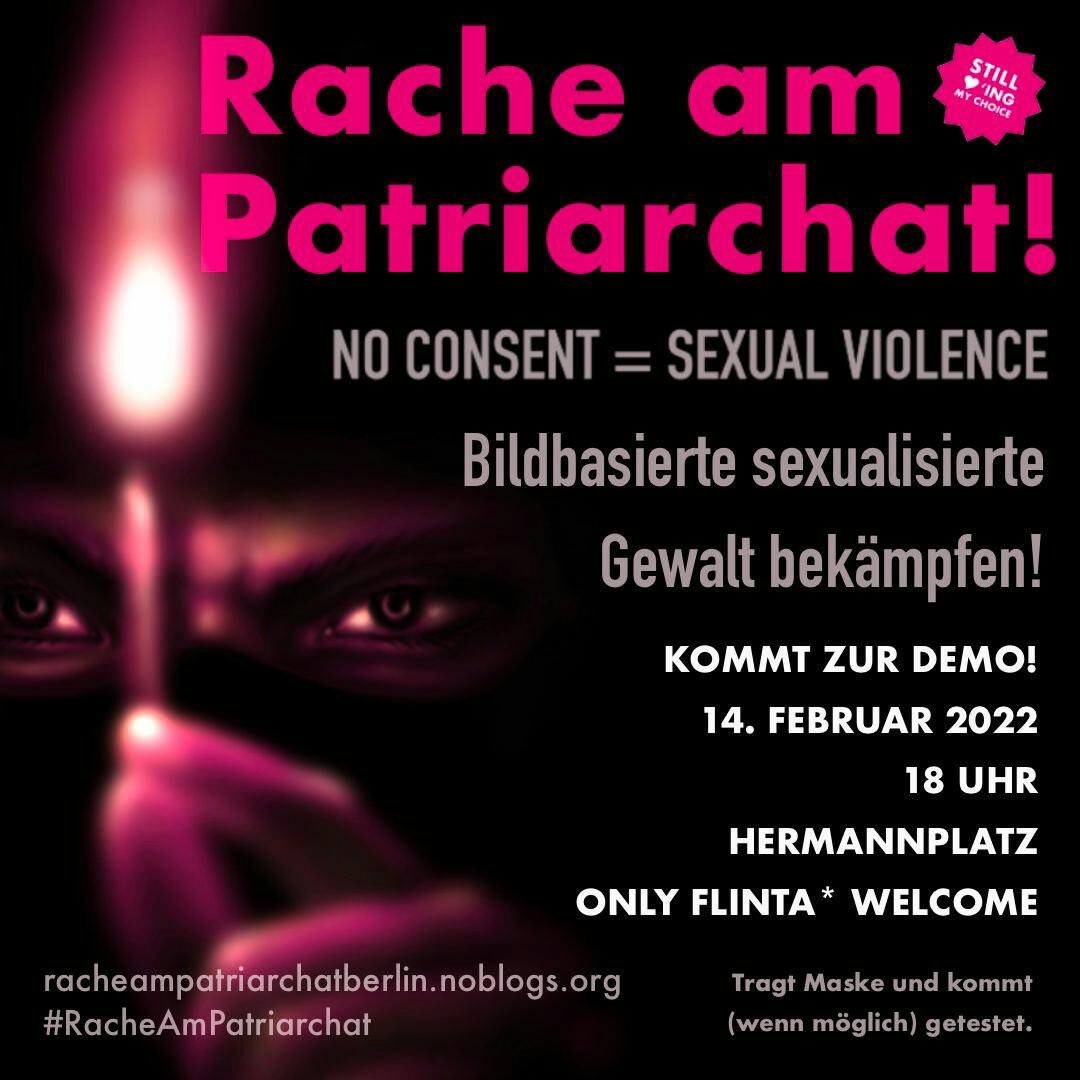14.2.2022 -18 Uhr – Hermannplatz
-english and german version below-
-deutsche unten-
La violencia machista, patriarcal, tiene muchas formas de expresión. Algunas son más explícitas y otras más sutiles, desde su expresión más brutal como el feminicidio a formas cotidianas de discriminación, abuso o reproducción de roles y estereotipos.
La violencia sexual, como una de las expresiones del patriarcado, también se manifiesta de muchas formas: en la calle, en las relaciones, en la publicidad, los ámbitos de trabajo o los festivos… desde las violaciones a la objetualización del cuerpo de las mujeres* (o partes de él)
Algunas de esas violencias están mercantilizadas, y son funcionales al capitalismo, otras estan profundamente arraigadas en el imaginario colectivo como modelos de comportamiento y de género. Las hay que producen rechazo inmediato, otras resultan casi imperceptibles. Pero todas, todas, forman parte de nuestro cotidiano. Un cotidano que ejerce violencia de manera asimétrica segun el cuerpo que habitemos, segun nuestro aspecto, nuestro estatus social, nuestra orientación sexual, o nuestra adaptación a lo normativo. Nos afecta a todes, aunque no sea de la misma manera.
Nosotras no separamos todas esas formas de violencia, porque entendemos que forman parte de un mismo sistema de dominación: visibilizarlo, cuestionarlo, desmontarlo, hacerle frente, es una tarea también cotidiana.
La manifestación rache am patriarchat surge precisamente como una alianza de respuesta pública y colectiva, a partir de una de esas formas de violencia que tuvo lugar hace cuatro años en el festival „Monis Rache”*
Salir a la calle, un 14 de febrero, para “vengarnos” juntas, mediante la alegría de la fuerza colectiva contra la imposición de la violencia, es una forma de empezar a vencerla.
Contra toda forma de violencia hacia nosotras (FLINTA) por todas nosotras. Rachen am Patriarchat.
Ni Una Menos Berlin.
#Niunamenos
Patriarchal violence has many forms of expression. Some are more explicit and others more subtle, from its most brutal expression as femicide to everyday forms of discrimination, abuse or reproduction of roles and stereotypes.
Sexual violence, as one of the expressions of patriarchy, also manifests itself in many forms: in the street, in relationships, in advertising, in the workplace or at parties… from rape to the objectification of women’s-FLINTA bodies (or parts of them).
Some of these violences are commercialized, and are functional to capitalism, others are deeply rooted in the collective imaginary as models of behavior and gender. Some produce immediate rejection, others are almost imperceptible. But all of them, all of them, are part of our daily lives. A daily life that exercises violence in an asymmetrical way according to the body we inhabit, according to our appearance, our social status, our sexual orientation, or our adaptation to the normative. It affects us all, even if not in the same way.
We do not separate all these forms of violence, because we understand that they are part of the same system of domination: to make it visible, to question it, to dismantle it, to confront it, is also a daily task.
The demonstration “rache am patriarchat” arises precisely as an alliance of public and collective response, from one of these forms of violence that took place four years ago at the festival “Monis Rache “*.
Taking the streets, on February 14th, to “take revenge” together, through the joy of collective strength against the imposition of violence, is a way to begin to defeat it.
Against all forms of violence against us (FLINTA) for all of us. Rachen am Patriarchat.
Ni Una Menos Berlin.
Männlich-chauvinistische, sexistische patriarchalische Gewalt hat viele Ausdrucksformen. Einige sind expliziter, andere subtiler, von der brutalsten Form wie Feminizide bis hin zu alltäglichen Formen der Diskriminierung, des Missbrauchs oder der Reproduktion von Rollen und Stereotypen.
Sexuelle Gewalt, als eine der Ausdrucksformen des Patriarchats, zeigt sich ebenfalls in vielen Formen: auf der Straße, in Beziehungen, in der Werbung, am Arbeitsplatz oder auf Partys… von der Vergewaltigung bis hin zur Verdinglichung von Frauenkörpern* (oder Teilen von ihnen).
Ein Teil dieser Gewalt ist kommerziell und funktional für den Kapitalismus, ein anderer Teil ist tief in der kollektiven Vorstellungswelt als Verhaltens- und Geschlechtervorbilder verwurzelt. Einige führen zu sofortiger Ablehnung, andere sind kaum wahrnehmbar. Aber alle, AUSNAHMSLOS, sind Teil unseres täglichen Lebens. Ein Alltag, der Gewalt asymmetrisch ausübt, je nach dem Körper, den wir bewohnen, je nach Aussehen, sozialen Status, sexuellen Orientierung oder unserer Anpassung an das Normative. Sie betrifft uns alle, wenn auch nicht auf die gleiche Weise.
Wir trennen all diese Formen der Gewalt nicht voneinander, weil wir der Meinung sind, dass sie Teil desselben Herrschaftssystems sind: es sichtbar zu machen, es in Frage zu stellen, es abzubauen, ihm entgegenzutreten, ist auch eine tägliche Aufgabe.
Die “Rache am Patriarchat”-Demonstration entstand gerade als Bündnis der öffentlichen und kollektiven Reaktion auf eine dieser Formen von Gewalt, die vor vier Jahren auf dem “Monis Rache”-Festival* stattfand.
Am 14. Februar auf die Straße zu gehen, um gemeinsam “Rache zu nehmen”, durch die Freude an der kollektiven Stärke gegen die Auferlegung von Gewalt, ist ein Weg, diese zu besiegen.
Gegen alle Formen von Gewalt gegen uns (FLINTA), FÜR UNS ALLE.
